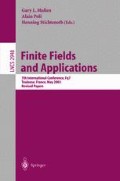Abstract
Two orthonormal bases B and B′ of a d-dimensional complex inner-product space are called mutually unbiased if and only if |〈b|b′ 〉|2 = 1/d holds for all b ∈ B and b′ ∈ B′. The size of any set containing pairwise mutually unbiased bases of ℂd cannot exceed d + 1. If d is a power of a prime, then extremal sets containing d+1 mutually unbiased bases are known to exist. We give a simplified proof of this fact based on the estimation of exponential sums. We discuss conjectures and open problems concerning the maximal number of mutually unbiased bases for arbitrary dimensions.
Access this chapter
Tax calculation will be finalised at checkout
Purchases are for personal use only
Preview
Unable to display preview. Download preview PDF.
References
Alltop, W.O.: Complex sequences with low periodic correlations. IEEE Transactions on Information Theory 26(3), 350–354 (1980)
Aravind, P.K.: Solution to the king’s problem in prime power dimensions. Z. Naturforschung 58a, 2212 (2003)
Bandyopadhyay, S., Boykin, P.O., Roychowdhury, V., Vatan, F.: A new proof of the existence of mutually unbiased bases. Algorithmica 34, 512–528 (2002)
Bechmann-Pasquinucci, H., Tittel, W.: Quantum cryptography using larger alphabets. Phys. Rev. A 61(6), 062308 (2000)
Bennett, C.H., Brassard, G.: Quantum cryptography: Public key distribution and coin tossing. In: Proceedings of the IEEE Intl. Conf. Computers, Systems, and Signal Processing, pp. 175–179. IEEE, Los Alamitos (1984)
Beth, T., Jungnickel, D., Lenz, H.: Design Theory, 2nd edn., vol. 2. Cambridge University Press, Cambridge (1999)
Bollobás, B.: Random Graphs. Academic Press, London (1985)
Carlet, C.: One-weight Z4-linear codes. In: Buchmann, J., Høholdt, T., Stichtenoth, H., Tapia-Recillas, H. (eds.) Coding Theory, Cryprography and Related Areas, pp. 57–72. Springer, Heidelberg (2000)
Chaturvedi, S.: Aspects of mutually unbiased bases in odd-prime-power dimensions. Phys. Rev. A 65, 044301 (2002)
Chowla, S., Erdös, P., Strauss, E.G.: On the maximal number of pairwise orthogonal latin squares of given order. Canadian J. Math. 12, 204–208 (1960)
Delsarte, P., Goethals, J.M., Seidel, J.J.: Bounds for systems of lines, and Jacobi polynomials. Philips Res. Repts., 91–105 (1975)
Englert, B.-G., Aharonov, Y.: The mean king’s problem: Prime degrees of freedom. Phys. Letters 284, 1–5 (2001)
Hoggar, S.G.: t-designs in projective spaces. Europ. J. Combin. 3, 233–254 (1982)
Ivanović, I.D.: Geometrical description of quantal state determination. J. Phys. A 14, 3241–3245 (1981)
Kabatiansky, G.A., Levenshtein, V.I.: Bounds for packings on a sphere and in space. Problems of Information Transmission 14(1), 1–17 (1978)
Laywine, C.F., Mullen, G.L.: Discrete Mathematics Using Latin Squares. John Wiley, New York (1998)
Lidl, R., Niederreiter, H.: Introduction to finite fields and their applications, 2nd edn. Cambridge University Press, Cambridge (1994)
Schwinger, J.: Unitary operator bases. Proc. Nat. Acad. Sci. U.S.A. 46, 570–579 (1960)
Vaidman, L., Aharonov, Y., Albert, D.Z.: How to ascertain the values of σ x , σ y , and σ z . Phys. Rev. Lett. 58, 1385–1387 (1987)
Wan, Z.-X.: Quaternary Codes. World-Scientific, Singapore (1997)
Wilson, R.M.: Concerning the number of mutually orthogonal Latin squares. Discr. Math. 9, 181–198 (1974)
Wootters, W.K., Fields, B.D.: Optimal state-determination by mutually unbiased measurements. Ann. Physics 191, 363–381 (1989)
Yang, K., Helleseth, T., Kumar, P.V., Shanbhag, A.G.: On the weight hierarchy of Kerdock codes over Z4. IEEE Transactions on Information Theory 42(5), 1587–1593 (1996)
Zauner, G.: Quantendesigns – Grundzüge einer nichtkommutativen Designtheorie. PhD thesis, Universität Wien (1999)
Author information
Authors and Affiliations
Editor information
Editors and Affiliations
Rights and permissions
Copyright information
© 2004 Springer-Verlag Berlin Heidelberg
About this paper
Cite this paper
Klappenecker, A., Rötteler, M. (2004). Constructions of Mutually Unbiased Bases. In: Mullen, G.L., Poli, A., Stichtenoth, H. (eds) Finite Fields and Applications. Fq 2003. Lecture Notes in Computer Science, vol 2948. Springer, Berlin, Heidelberg. https://doi.org/10.1007/978-3-540-24633-6_10
Download citation
DOI: https://doi.org/10.1007/978-3-540-24633-6_10
Publisher Name: Springer, Berlin, Heidelberg
Print ISBN: 978-3-540-21324-6
Online ISBN: 978-3-540-24633-6
eBook Packages: Springer Book Archive

